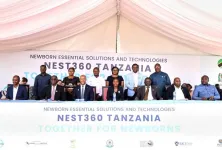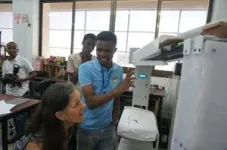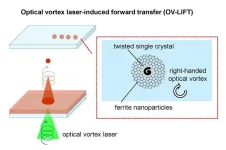(Press-News.org) HOUSTON – (June 25, 2024) – Rice University President Reginald DesRoches joined Rice360 Institute for Global Health Technologies Co-Director Maria Oden and Rice360 supporters on a trip to Africa this summer marking significant milestones on the road to ending preventable newborn deaths in the sub-Saharan region. Rice360 is one of 22 organizations in the Newborn Essential Solutions and Technologies (NEST360) international alliance, and this trip signified Rice’s continued collaboration in the program.
After an initial visit to Malawi, where the NEST360 bundle has been implemented in hospitals across all 28 districts, the group traveled to Tanzania. There the first stop on the itinerary was Mwananyamala Hospital ⎯ one of several primary care, Level 2 hospitals established as a NEST360-implementing site during Phase 1 of the program in Tanzania.
Next, the group traveled to Ubungo Hospital, a future NEST360-implementing site, where DesRoches, Tanzanian Ministry of Health representatives and key local and international partners participated in a formal event celebrating the launch of Phase 2.
“It is truly my distinct honor to be here today to celebrate the launch of NEST360 Phase 2 and the commitment to increased newborn survival in sub-Saharan Africa,” DesRoches said, highlighting NEST360’s demonstrated commitment to work collaboratively with governments in the region. “To be able to solve the world’s most pressing problems, you have to collaborate and partner. It’s one thing to develop the technologies in the lab, but if you don’t have the partnerships that understand the societal issues, the cultural issues, the economic issues, the problems won’t be solved adequately.”
As part of Phase 2, NEST360 aims to deliver and sustain lifesaving innovations, provide hands-on education for health professionals and use data for action, improving quality and learning among the country’s partners in newborn and maternal health care. During the Phase 2 launch, the Tanzanian government announced its plan to invest an additional $7.1 million to improve the infrastructure of newborn wards in 25 hospitals across four mainland regions and three hospitals in Zanzibar, which aligns with the government’s efforts to reduce neonatal deaths. The Tanzanian government also “plans to spend over $50 million on infrastructure, equipment, and capacity building for newborn care” over the next three years, said Dr. Felix Bundala, assistant director for newborn, child and adolescent health with Tanzania’s Ministry of Health.
The current mortality rate for newborns in Tanzania is 24 per 1,000 live births with over 46,000 newborn deaths each year. The government hopes to cut that number in half, in line with the United Nations’ Sustainable Development Goals (SDGs), which set a target for infant mortality at rates no greater than 12 per 1,000 live births.
Tanzania has made concerted efforts in recent years to improve its health care system and has successfully moved the needle on maternal and child mortality. In a statement given during the launch, Dr. Grace Magembe, deputy secretary general in the Tanzanian Ministry of Health, cited an 80% decline in the number of maternal deaths and a 36% decline in mortality for children under 5 as examples of effective government initiatives advancing strategic national interests and global sustainability goals.
However, Magembe pointed out that despite significant gains on these related SDG benchmarks, newborn mortality registered only a 4% decrease over the same period. “As a country, we feel that we have a lot to do in terms of reducing the death of newborns,” Magembe said, adding that current improvements, however small, are the result of NEST360 collaborative efforts.
“NEST360 is a true partner to this government because they’re really contributing towards the vision of this country,” she said.
In Phase 1, NEST360 and the Ministry of Health designed a package of evidence-based, locally relevant interventions for small and sick newborn care that was implemented in Muhimbili National Hospital, the largest public hospital in Tanzania; three regional referral hospitals, including Mwananyamala; and several facilities in rural areas.
These additional NEST360-implementing sites helped ease congestion in neonatal care units at Muhimbili. Prior to NEST360 implementation, it was not uncommon to find one baby cot with six to seven newborns at this hospital, whereas today, “one baby cot is for one baby,” Magembe said.
A critical part of the NEST360 impact in Tanzania is the focus on evidence-based solutions. Dr. Nahya Salim Masoud, NEST360 steering committee deputy chair and a clinical pediatric specialist at the Muhimbili University of Health and Allied Sciences (MUHAS), said that one of the reasons efforts to improve newborn survival in Tanzania faced a much slower rate of progress than other SDG benchmarks was the lack of data on neonatal health and survival as a distinct area of intervention. NEST360-implementing medical facilities established in the country during Phase 1 enabled program and government officials to leverage data in support of continued coordinated planning to strengthen health systems in Phase 2.
“Our data shows that focusing on inpatient care facilities can yield an impact,” Masoud said. “We currently have all the ingredients in place [to make a difference].”
In addition to Rice leadership and Tanzanian government officials, present at the event were representatives of key NEST360 collaborators in Tanzania, including Rice360, Dar es Salaam Institute of Technology (DIT), Ifakara Health Institute and MUHAS.
The trip continued with site visits to MUHAS and DIT. DesRoches signed a memorandum of understanding between Rice and MUHAS to establish a collaboration that focuses on training, research, innovation and biomedical engineering. MUHAS will also establish a new design studio as part of the partnership.
DIT is one of the NEST360 educational partners in Tanzania and home to an engineering design studio that provides students with the tools and environment to engage in hands-on, experiential learning. The design space highlights an important feature of the NEST360 approach, which views the establishment of an education ecosystem that fosters innovation as a critical part of sustainable, long-term global impact. The goal of this ecosystem is to develop a skilled workforce that can develop and maintain solutions to location-specific problems.
“Locally, the design studio has solved so many challenges,” said John Msumba, director general of DIT. “Our students have been visiting hospitals, and they try to identify problems with the biomedical equipment. They bring [the devices] to the design studio, and they fix them.” Msumba said the goal is for the design studio to serve not only as a training and maintenance site but also as a springboard for medical technology innovation.
“Investing in engineering and engineering students here in Africa is critically important in order to address health care challenges,” said Oden, who is also a teaching professor of bioengineering and director of Rice’s Oshman Engineering Design Kitchen. “Rice360’s mission is to innovate for global impact, and we do this in two ways. We transform students into innovators … and when those students have amazing ideas, we work to transform those ideas into actual solutions.
“Part of how we’ve worked with African institutions is that we’ve partnered with faculty and engineering schools to support them in achieving these two objectives so that engineering students come out of university ready to solve real-world challenges and to make a difference, to become the leaders of the future right here in their home countries.”
-30-
This news release can be found online at news.rice.edu.
Follow Rice News and Media Relations via Twitter @RiceUNews.
Video is available at:
https://www.youtube.com/watch?v=5PaQWYV_qIo
(Video by Brandon Martin)
B-roll links:
Footage of Malawi hospital visit (2024):
https://rice.box.com/s/5lrcvy2543qvgd6ddfjm9b2aokhw8gg7
NEST360 in Tanzania (2024):
https://rice.box.com/s/x0n9k6p887cvmrymp7jj1hgi7iu5aht9
Footage of NEST360 Phase 2 launch:
https://rice.app.box.com/s/vmnbm328vvcamfw78alp1e66a3300ok8
Footage of NEST360 operations in Africa:
https://rice.app.box.com/s/vmnbm328vvcamfw78alp1e66a3300ok8
Image downloads:
URL: https://news-network.rice.edu/news/files/2024/07/B29A9458.jpg
CAPTION: Grace Magembe (left) and Reginald DesRoches at the Phase 2 launch in Tanzania holding a BiliDx device, a point-of-care bilirubinometer that aids health care workers to diagnosis and treat jaundice, which was a Rice University student project and became a NEST360 qualified device. (Credit: Ifakara Health Institute)
URL: https://news-network.rice.edu/news/files/2024/07/DSC02596.jpg
CAPTION: A newborn at Kamuzu Central Hospital in Lilongwe, Malawi, on a pulse oximeter. (Credit: Ernest M’banga)
URL: https://news-network.rice.edu/news/files/2024/07/DSC02783.jpg
CAPTION: Engineering students from the Malawi University of Science and Technology showcasing their solar-powered device. (Credit: Ernest M’banga)
URL: https://news-network.rice.edu/news/files/2024/07/DSC07650.jpg
CAPTION: An engineering student is showing Maria Oden (bottom left) a student-prototyped radiant warmer designed to be used in power-scarce locations during a visit to Dar es Salaam Institute of Technology. (Credit: Emily Bull/Rice University)
URL: https://news-network.rice.edu/news/files/2024/07/B29A9602.jpg
CAPTION: Rice University President Reginald DesRoches (left) signed a memorandum of understanding with Acting Deputy Vice Chancellor Emmanuel Balandya to establish a collaboration between the Muhimbili University of Health and Allied Sciences and Rice that focuses on training, research, innovation and biomedical engineering. (Credit: Ifakara Health Institute)
URL: https://news-network.rice.edu/news/files/2024/07/B29A9517.jpg
CAPTION: Nahya Salim (from left), Reginald DesRoches, Grace Magembe holding baby Rahma — beneficiary of NEST360 — Mama Rahma, Honorati Masanja and Maria Oden. (Credit: Ifakara Health Institute)
URL: https://news-network.rice.edu/news/files/2024/07/B29A9490.jpg
CAPTION: A Rice University delegation including President Reginald DesRoches was joined by Tanzanian government officials and key NEST360 collaborators in Tanzania for an event celebrating the launch of Phase 2 of the NEST360 program. (Credit: Ifakara Health Institiute)
Related stories:
Reducing newborn deaths across Africa enters Phase 2 with $65M:
https://news.rice.edu/news/2024/reducing-newborn-deaths-across-africa-enters-phase-2-65m#:~:text=The%20Newborn%20Essential%20Solutions%20and,Fund%20Foundation%2C%20The%20ELMA%20Foundation
Rice-led TMC-based research center will develop affordable global health technologies for early cancer detection:
https://news.rice.edu/news/2023/rice-led-tmc-based-research-center-will-develop-affordable-global-health-technologies
Newborn baby deaths in Africa targeted in $68M initiative:
https://news.rice.edu/news/2019/newborn-baby-deaths-africa-targeted-68m-initiative#:~:text=NEST360%C2%B0%2C%20an%20international%20team,of%20two%20four%2Dyear%20phases.
About Rice:
Located on a 300-acre forested campus in Houston, Rice University is consistently ranked among the nation’s top 20 universities by U.S. News & World Report. Rice has highly respected schools of architecture, business, continuing studies, engineering, humanities, music, natural sciences and social sciences and is home to the Baker Institute for Public Policy. With 4,574 undergraduates and 3,982 graduate students, Rice’s undergraduate student-to-faculty ratio is just under 6-to-1. Its residential college system builds close-knit communities and lifelong friendships, just one reason why Rice is ranked No. 1 for lots of race/class interaction, No. 2 for best-run colleges and No. 12 for quality of life by the Princeton Review. Rice is also rated as a best value among private universities by Kiplinger’s Personal Finance.
END
Tanzanian officials praise NEST360 contribution to newborn care
Alliance recognized as ‘a true partner’ in the effort to end preventable newborn deaths
2024-07-25
ELSE PRESS RELEASES FROM THIS DATE:
4D Medicine raises £3.4 million for unique biomaterial platform
2024-07-25
4D Medicine, a spin-out from the Universities of Birmingham and Warwick has raised £3.4m ($4.4m) in a Series A investment.
The funding round was backed by Oshen Holdings, DSW Ventures, SFC Capital, Boundary Capital and private investors including several leading scientists and surgeons. It will enable the company to complete pre-clinical testing of its first product range and seek FDA clearance for entry into the US market.
4D is a UK-based company whose innovative biomaterial has potential to be used for a wide range of 3D printed implants and surgical devices. Its product 4Degra is a resorbable biomaterial that is being used to develop ...
Ancient marine animal had inventive past despite being represented by few species, new study finds
2024-07-25
The findings, published today in Nature Ecology & Evolution, sheds light on some core principles of the evolution of modern biodiversity.
In current oceans, molluscs such as clams, oysters, and snails are hugely diverse, with over 50,000 species, whereas brachiopods are rare by comparison with only 394 species known. But this was not always the case. The team have found that brachiopods were evolving new shell shapes and ecological behaviours following the end-Permian mass extinction which compromised their numbers.
“In the Palaeozoic, from 540 to 250 million years ago, brachiopods ruled the seabed,” ...
Quantum sensor for the atomic world developed through international scientific collaboration
2024-07-25
In a scientific breakthrough, an international research team from Germany's Forschungszentrum Jülich and Korea's IBS Center for Quantum Nanoscience (QNS) developed a quantum sensor capable of detecting minute magnetic fields at the atomic length scale. This pioneering work realizes a long-held dream of scientists: an MRI-like tool for quantum materials.
The research team utilized the expertise of bottom up single-molecule fabrication from the Jülich group while conducting experiments at QNS, utilizing the Korean team’s leading-edge ...
The research was wrong: study shows moderate drinking won’t lengthen your life
2024-07-25
PISCATAWAY, NJ – Probably everyone has heard the conventional wisdom that a glass of wine a day is good for you--or you’ve heard some variation of it. The problem is that it’s based on flawed scientific research, according to a new report in the Journal of Studies on Alcohol and Drugs.
Over the years, many studies have suggested that moderate drinkers enjoy longer lives with lower risks of heart disease and other chronic ills than abstainers do. That spurred the widespread belief that alcohol, in moderation, can be a health tonic. However, not all studies have painted such a rosy picture--and the ...
Save your data on printable magnetic devices? New laser technique’s twist might make this reality
2024-07-25
The proliferation of all things digital doesn’t mean that printing technology is no longer relevant. In fact, printing technology is required to make the semiconductors necessary for the digital world. And as an Osaka Metropolitan University-led team has shown using a new printing technique, printable magnetic devices for high-density data storage might soon be realized.
Dr. Ken-ichi Yuyama, a lecturer at the Graduate School of Science, and his colleagues report in APL Materials on the development of a new type of laser-induced forward transfer ...
Early onset dementia more common than previously reported – the incidence of Alzheimer’s disease seems to be on the rise
2024-07-25
A new major study by the University of Eastern Finland, the University of Oulu and Neurocenter Finland explored early-onset dementia in the working-age population in Finland. The study cohort was one of the largest in the world to date, and the findings were published on 24th of July 2024 in Neurology®, the medical journal of the American Academy of Neurology.
Current epidemiological data on early-onset dementia is scarce and based on small study cohorts, with no recent data from Finland available. For the present ...
Pesticides potentially as bad as smoking for increased risk in certain cancers
2024-07-25
In modern day agriculture, pesticides are essential to ensure high enough crop yields and food security. These chemicals, however, can adversely affect plant and animal life as well as the people exposed to them.
Now, in a population-based, nation-wide study, researchers in the US have put increased cancer risk through agricultural pesticide use into context with smoking, a better understood cancer risk factor. The results were published in Frontiers in Cancer Control and Society.
“In our study we found that for some cancers, the effect of agricultural pesticide usage is comparable in magnitude to the effect of smoking,” said the study’s ...
NUS researchers develop new battery-free technology to power electronic devices using ambient radiofrequency signals
2024-07-25
Ubiquitous wireless technologies like Wi-Fi, Bluetooth, and 5G rely on radio frequency (RF) signals to send and receive data. A new prototype of an energy harvesting module – developed by a team led by scientists from the National University of Singapore (NUS) – can now convert ambient or ‘waste’ RF signals into direct current (DC) voltage. This can be used to power small electronic devices without the use of batteries.
RF energy harvesting technologies, such as this, is essential as they reduce battery dependency, extend device lifetimes, minimise environmental impact, and enhance the feasibility of wireless sensor networks and IoT devices in remote ...
New protein discovery may influence future cancer treatment
2024-07-25
Researchers from the University of Otago, Christchurch, have spearheaded the discovery of a protein function which has the potential to guide the development of novel cancer treatment options and improve the diagnosis of various cancers.
The exciting research finding, carried out alongside Dr Vanessa Morris from the University of Canterbury’s School of Biological Sciences as well as researchers in Australia and Denmark, centres on the activity of a tumour- suppressing protein called p16.
The discovery, published in the British scientific journal Nature Communications and first authored by ...
Timing matters: Scripps Research study shows ways to improve health alerts
2024-07-25
LA JOLLA, CA—When seemingly healthy people receive an alert from a wearable sensor telling them they might have a respiratory virus—based on small changes in their unique heartrate, sleep and activity patterns—what do they do? According to a new study by Scripps Research scientists carried out at the height of the COVID-19 pandemic, only a quarter of people follow up such an alert with an at-home viral test.
That is just one conclusion of the new study, published in The Lancet Digital Health on July 24, 2024, which tested the feasibility ...
LAST 30 PRESS RELEASES:
Study finds more parents saying ‘No’ to vitamin K, putting babies’ brains at risk
Scientists develop new gut health measure that tracks disease
Rice gene discovery could cut fertiliser use while protecting yields
Jumping ‘DNA parasites’ linked to early stages of tumour formation
Ultra-sensitive CAR T cells provide potential strategy to treat solid tumors
Early Neanderthal-Human interbreeding was strongly sex biased
North American bird declines are widespread and accelerating in agricultural hotspots
Researchers recommend strategies for improved genetic privacy legislation
How birds achieve sweet success
More sensitive cell therapy may be a HIT against solid cancers
Scientists map how aging reshapes cells across the entire mammalian body
Hotspots of accelerated bird decline linked to agricultural activity
How ancient attraction shaped the human genome
NJIT faculty named Senior Members of the National Academy of Inventors
App aids substance use recovery in vulnerable populations
College students nationwide received lifesaving education on sudden cardiac death
Oak Ridge National Laboratory launches the Next-Generation Data Centers Institute
Improved short-term sea level change predictions with better AI training
UAlbany researchers develop new laser technique to test mRNA-based therapeutics
New water-treatment system removes nitrogen, phosphorus from farm tile drainage
Major Canadian study finds strong link between cannabis, anxiety and depression
New discovery of younger Ediacaran biota
Lymphovenous bypass: Potential surgical treatment for Alzheimer's disease?
When safety starts with a text message
CSIC develops an antibody that protects immune system cells in vitro from a dangerous hospital-acquired bacterium
New study challenges assumptions behind Africa’s Green Revolution efforts and calls for farmer-centered development models
Immune cells link lactation to long-lasting health
Evolution: Ancient mosquitoes developed a taste for early hominins
Pickleball players’ reported use of protective eyewear
Changes in organ donation after circulatory death in the US
[Press-News.org] Tanzanian officials praise NEST360 contribution to newborn careAlliance recognized as ‘a true partner’ in the effort to end preventable newborn deaths







